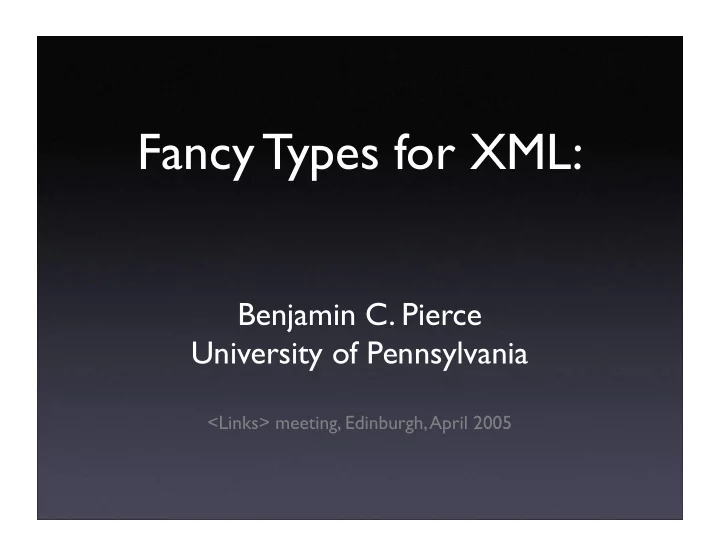

Fancy Types for XML: Benjamin C. Pierce University of Pennsylvania <Links> meeting, Edinburgh, April 2005
Fancy Types for XML: Friend or Foe? Benjamin C. Pierce University of Pennsylvania <Links> meeting, Edinburgh, April 2005
XML and the Web • Any candidate web-programming language must deal seriously with XML • At least, there must be good support for XML concrete syntax... but this is a pretty trivial matter. • The real question: How XML gets into the type system?
Xtatic • Xtatic is a lightweight extension of C# with • regular types (a la XDuce) • regular pattern matching See my web page for lots of papers
The Xtatic Experience What was learned: • XML processing with "native" static types is indeed very pleasant • rich type structure of many XML documents more traction for type system
The Xtatic Experience What was learned: • XPath-style ("vertical") and regular-pattern-style ("horizontal") pattern matching are both very useful, in different situations • it appears [cf. Benzaken et al 2005, Gapeyev&Pierce 2004, etc.] that they can be placed on a common foundation • one nice use-case for the horizontal style is statically typed string regexps • another is that horizontal patterns also generalize ML-style algebraic pattern matching See our PLANX ‘05 paper for more details
The Less-Than-Xtatic Experience Some tricky issues... • Standards compliance (W3C Schema, XPath, etc., etc.) • "Best effort" approach (but, e.g., no notion of "Schema-validated run-time values) • deciding subtyping efficiently • algorithms are known that seem to be "efficient enough in practice," but these are not trivial to implement [Hosoya/Vouillon/Pierce ICFP 2000] • compiling regular patterns efficiently [but cf. Michael Levin's forthcoming dissertation] • Precise type inference for pattern variables [but not clear it is absolutely necessary] • Finding the "right" type system for attributes is still an open problem [but see proposal by Hosoya&Murata]
Some Critical Design Points • Structural (types are descriptions of structure of values) vs. nominal (each value is tagged at run time with a single atomic "type name" that it belongs to) treatment of types • Interaction between subtyping of XML types and the full language's subtype relation. (Your language has subtyping, right??) • Single-type tree grammars (W3C Schema, XQuery) vs. full regular tree grammars (XDuce, Xtatic, CDuce, RelaxNG, etc.) • Power of the language of XML types (unions and recursion for sure; but what about intersections? differences? interleaving?)
Recommend
More recommend